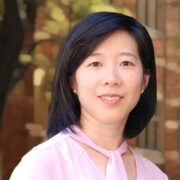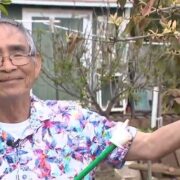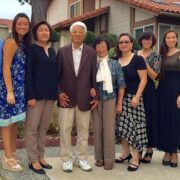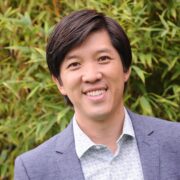身為臺灣人
作者:謝昭梅(夏眉)
我發覺自己 越來越笨拙膽小了,日常生活中有許多大大小的事,別人看來大概輕而易舉吧?我卻戰戰兢兢,躊躇不前。譬如說,我在下雪天盡可能不出門,因爲怕跌斷了腿;我 不敢獨個兒開車到陌生的地方,因爲怕迷路,囘不了家;我也怕跟人爭辯,因爲不管我的理由多充分,結果我都只有認輸的份。其實不要說爭辯,就連表達最簡單的 思想或描述最平常的一件事,我都會因爲找不到適當的字眼而卡住了。可以説,每次一開口,衆人的眼光都轉過來對著我時,我卻張口結舌, 不知所云了。
猶記得唸中學的時候,我還蠻勾鑽的,頭腦也還靈光,所以常喜歡跟同學鬥嘴取樂。 可 是隨着環境的變遷與歲月的增長,我變得越來越遲鈍了。明明有話説,但掙扎了半天,卻不知怎麽表達才好。這毛病不單是我的思考沒頭緒,而且也跟我平日使用語 言的混雜有關。我常常無法決定,到底用臺灣話呢?還是用中國話?或者乾脆用英語?我這麽一再猶疑,越來越沒了主意,那腦袋瓜子就像一臺生了銹的機器,操作 起來,慢吞吞的讓人心急。結果,我總是湊合着用臺灣話,中國話,和英語,拉拉雜雜地說,比手劃腳地加重語氣,結果還是詞不達意。本來已經是個木訥的人,如 今更覺得多說一句,倒不如少說一句了。
若說平日在 家,這麽隨便混混也就算了。可是我卻有一份吃不飽餓不死的工作;而我那工作的場所,是個小小的圖書館;一個麻雀型的聯合國。同事中有菲律賓人,有美國人, 有土耳其人,有荷蘭人,有韓國人,有日本第一代,有日本第二代,有臺灣來的外省人,也有臺灣來的臺灣人;真是龍蛇混雜的是非之地。
記得我在那裏工作還不到一年吧?有一天,我和美國上司一塊兒吃中飯,她問我,“妳覺得我們圖書館的同事之間有地域的衝突嗎?”
我睜大了眼睛看着她,“妳是什麽意思?我不懂。”
“譬如說,外省人和臺灣人之間 …?”
“沒有啊。妳爲什麽提起這問題?”
她躊躇了半天,終究沒有把心中的話説出來。我雖然好奇,可是不好意思打破沙鍋問到底,只好在心裏存放着一個疑問。
我們在圖書館,每天逢到吃中餐的時間,廚房裏香氣四溢,笑聲一波未平,一波又起,好熱鬧; 可以說,那是一天之中最逍遙而輕鬆的時光。我們吃飯的時間是依照語言來安排的;日本人在正午十二點吃;外省人跟臺灣人在下午一點鐘吃;至於美國佬與零零星星的外夷,他們大概不懂得節省吧?一向都在學校餐廳吃飯,不跟我們爭地盤。
有一天,我們跟往常一樣,大夥兒圍着餐桌談笑,一個外省同事說,“妳們臺灣話裏面沒有“F”的發音吧?“
“不錯。”
“難怪有些臺灣人把“花非花,霧非霧”念成了“花灰花,霧灰霧,” 她笑着說。
我想了很久,腦子打了好幾個轉,終於才對她說,“妳別笑;妳說臺灣話,別人大概都聼不懂。”
“那當然了,我根本不會說臺灣話。”
“真的?妳不是兩歲時就跟着父母從大陸逃亡到臺灣嗎?”
“是呀。”
“妳是哪一年到美國來的?”
“二十五歲那一年。”
“這麽說,妳是在臺灣長大的;妳吃了二十三年臺灣的米,喝了二十三年臺灣的水,可是卻沒有學臺灣話, 那不是很奇怪嚒?”
“這有甚麽好奇怪的?我從來就不覺得有學臺灣話的必要,因爲我認識的人,結交的朋友都只說國語。”
“原來如此;我想妳跟那些住在紐約中國城的老華僑想法完全一樣!他們一代接一代,都只在中國城裏面混日子,根本沒有走出那個生活圈子的必要,所以也懶得花時間,費心神去學英語了。”
“妳別拿我跟那些人比,他們是苦力;是沒受教育的勞工階級,在美國的白人社會裏根本擡不起頭來, 所以只好躲在中國城裏混一生了。”
“我知道,妳和那些老華僑的情況正好相反!聽説令尊是一位退休的黨國元老,到底他的官位多高呢?”我不免好奇地問。
“這個我不能說,”她撇着嘴回答。
“爲什麽不能說?”我向她挑戰。
“不好說出來。”她擺出一副神秘的姿態, 卻又忍不住,要炫耀她父母的尊貴。“不過,我爸媽住的官邸有游泳池,有花園,出門都有轎車司機接送。”
我不好説,妳老爸老媽用的是臺灣人的血汗錢呀;而妳卻連一句臺灣話都不肯學。
“好吧,妳以前既然沒機會學臺灣話,從今天開始,我每天教妳一句,妳這麽一個聰明人,還怕學不來嗎?”
“妳要教我說什麽?”她有點不安地問。
我也不曉得該教她什麽,只望着窗外發呆;正好這時,一片浮雲飄飛了過去。
“妳試這一句看看吧? ‘雲在天頂飛’。”
果然她試了。“婚得梯丁杯。”
“怎麽樣?像不像?”她好奇地問。
我禁不住,笑彎了腰,“妳說的這句話,一點都不像臺灣話呢,我看也不會有人聼得懂。”
“妳別笑!我不是早就跟妳說我不會臺灣話麽?”
“妳現在多少能體會到學外來語有多難了吧?我們臺灣人生下來就說臺灣話, 那是我們的母語,說起來多順暢,多流利; 聼起來多悅耳,多自然啊;開始上學以後,要學中國話了,頭也開始痛了。妳知道嗎?我們臺灣話裏面不但沒有“F”這個音,也沒有“R”這個捲舌音,所以一句很簡單的話‘臺灣的夏天很熱’,有的人就說成了‘臺灣的夏天很樂’呢。”
我以爲那次的交談只不過是同事間的笑閙而已,並不掛在心上。怎料,過不了幾天就有人悄悄對我說,那些外省同事已把我看成了問題人物 — 我的思想有問題,態度也有問題。
我聼了,只一笑置之;心想,管他們怎麽說呢!誰也奈何我不得。
又有一次, 不知道爲什麽有人提起“二二八事件”,那是多麽敏感的話題呢;其實我對這一事件的真相並不清楚,因爲我一向對政治毫無興趣,對臺灣的歷史毫無了解;因爲我 們念的歷史教科書完全沒提到這回事。雖然出國後,偶爾曾聼人提及,可是我也只懂得一些皮毛而已。這個事件的來龍去脈,以及留下來的後果,我都只有很模糊的 概念。
如今聼到同事在熱烈地討論,我不免有點心驚,也有點好奇。
只見一個外省同事很憤慨地說,“那些台獨份子最喜歡炒冷飯,動不動就把‘二二八事件’擡出來吵吵嚷嚷的!好像是昨天才發生的事情一樣!其實,你們知道那一段日子裏,外省人每天的日子過得有多恐怖嗎?那些流氓惡棍,日夜不休,趁機到處找外省人,不管在火車上或者在街頭, 只要被他們聼出來或看出來是外省人,他們就抓起來打,打得頭破血流,你們知道有多少人被殺害了嗎?我最近看到一份官方的報導,說是‘二二八事件’的前後,外省人死了好幾千個!他們的命該由誰來賠呀?”
我聼得一愣一愣的;咦,到底什麽時候歷史被改寫了?那些有刀有槍,用恐怖政策來迫害臺灣老百姓的外來人,竟然搖身一變,變成犧牲者了。
我再也坐不住,抗議地反駁道,“不是有許多臺灣籍的教授,律師,醫生和大學生被抓了去,從此失去蹤影嗎?這些人,是臺灣社會的菁英,他們都被一掃而光了。”
“臺灣哪裏來的菁英?都是些沒受教育的農夫和小販吧了。要不是我們從大陸逃難來臺灣,幫你們辦教育,搞好經濟,你們還不是只會種田!”
那一次的辯論,我全部垮臺了;只恨自己心裏沒準備,腦子又遲鈍,懂得也太少,只好任由那些人捏造事實,侮辱了那無數的受害的臺灣人。
後來我才知道,那位最惡毒的攻擊者,原來就是那個屠殺無數臺灣人的將軍的女兒。
單是那幾個外省人已經讓人夠頭疼了;哪知,1987年初,我們學校來了五個中國人。他們是一塊兒被請來整理我們圖書館的善本書的;約期是兩年。因爲那些中國人在不同的辦公樓上班,所以我只偶爾跟他們碰面而已,並不熟。
很快的,兩年過去了,那同來的四個人都囘中國了;只有一個大陸妹卻不肯走;她想盡辦法,就是要賴在美國。我們的館長,經不起那個大陸妹的吹,拍,捧,經不起她低聲下氣的懇求,就決定暫時把她留下來了。
就在這時,中國的天安門事變發生了;1989年,中國的學運,使國際的輿論閙得沸沸騰騰。我們學校一位知名的教授挺身而出,大力地向校方遊説,希望學校能收容那些所謂的“民運人士”。學校不得不給他面子吧?只得答應了。於是一夜之間,那些陌生人蜂擁而至,讓人無法忽視。
好笑的是,那位不肯囘中國的大陸妹, 竟然搖身一變,也加入了這一群“民運人士”的行列!當時大家都很好奇,也很欽佩,這人竟如此的神通廣大,真是不同凡響;從當年一個“紅衛兵”,一下子脫胎換骨,變成了天安門的志士。
如此這般,她就留了下來,也跟那些天安門志士同進出了。
那些志士, 剛到我們學校時很受禮遇,都成了人人敬仰的熱門人物。後來,一年又一年,他們無所事事,語言又不通,卻老呆着不走,漸漸的,就成了寄生蟲。那個好心的教授 被搞得焦頭爛額,在灰心之餘,乾脆把這些人的生活費全部凍結了。那些人見沒錢可拿,當然就四分五裂,像雲煙,各自瓢飛了。只有我們那個大陸妹有遠見,她早 已安排好了,從天安門的志士,一變而成了我們圖書館的永久雇員,還讓北京的一家人都移居到美國來了。
我的那些外 省同事,終於有機會和祖國的同胞相處,怎不欣喜?都向她靠攏了過去,都說祖國的經濟如此輝煌騰達,真是二十世紀全世界最大的奇跡!大家都覺得身為中國人, 很值得驕傲!似乎都忘了,當年他們跟着父母,像喪家之犬,投奔到臺灣來時,是爲了什麽?他們離鄉背井,倉皇地逃命,不是因爲對共產黨狠毒的手段的恐懼麽? 如今他們躲到美國來了,卻口口聲聲要臺灣回歸祖國!堅持臺灣是中國的一部分!他們在臺灣安安穩穩地成長,卻一直沒有把臺灣看成是故鄉,對那片土地,沒有一 點愛心與眷戀,只急切地要拱手把它送到中國人手裏。更令人想不通的是,臺灣根本就不是他們的,所以他們有什麽資格將它送人?
一個外省同事這麽對我說,“我愛臺灣,也愛大陸,我不忍看一個國家被撕成了兩半,所以終究還是統一的好。畢竟,我們都是中國人。”
如此的昧良心,如此的忘恩負義,如此愚蠢的論調,我怎麽去跟她爭辯?只恨當年,我們沒有把這些人趕回臺灣海峽的對岸。
因爲每天都跟大陸妹見面,我漸漸地看清了她這個人。她平日裏笑臉常開,跟甚麽人都處得來;尤其是對她的上司,更是軟言細語,極盡奉承諂媚之能事。兩個人整天就這麽笑聲耳語;可以説,她是她的上司最好的朋友,最談得來的心腹。最難得的是,他們都說的北京話,多融洽呀。
“妳聼聼,北京話有多美!”她常在我面前,這麽誇耀她的上司和她自己。
可是碰到我這硬幫幫的人,就是聽不進去。
“你們每一個字都捲舌,我聼了很不習慣呢!總覺得有點做作,誇張。你們也不怕舌頭給捲斷了?”
就因這麽一句沒遮掩的批評,我一下子得罪了兩個人。
我每天看到那大陸妹笑嘻嘻,以爲她這人挺好的脾氣;怎知,有一天,一個同事爲了工作而跟她發生了衝突。她在盛怒之下,似乎驟然間變成了另一個人–她的聲音變得淩厲快速,她的神色,像個失去理智的兇手,她的話,像利劍,每一個字都要置人于死地!我想,這就是她的真面目吧?年輕時代加入了紅衛兵的行列,清算鬥爭是她的任務,伶牙俐齒是她的武器;如今都派上了用場?
這些年來,我已看過她幾次把鬥爭時代的伎倆搬出來。她的形象,不就是中國人的缩影嗎?每想到此,我不禁心驚膽戰,只想躲得遠遠的,以策安全。
我每天見到她,因此才有機會漸漸的了解中國人的真面目–他 們的伎倆,他們的自負,他們的奸詐,他們的侵略性,他們的挑釁,他們腐敗缺德的心性。因爲她,我才意識到臺灣的危機;我才深切地為自己故鄉的未來捏一把 汗。我不懂,爲什麽我們自己的同胞,只顧私己的利益而跟中國眉來眼去;把億萬的資金都搬到對岸去,養肥了敵人?難道他們看不出中國人有多可怕嗎?難道他們 看不出中國要併吞我們嗎?
每想起故鄉的人和故鄉的風光景色,我就憂心忡忡。真怕有那麽一天,我們自己人出賣了故鄉,害我們有家歸不得。
前幾天,大陸妹對我說,“臺灣人真是數典忘祖, 怎麽被日本佔據了五十年,就不承認自己是中國人了?”
“臺灣人當然不是中國人,”我說,“可是這跟日本人佔據臺灣五十年有什麽相干呢?我們也絕對不是日本人呀!我們是臺灣人,再簡單不過,沒什麽好爭執的。”
“妳不能否認妳的祖先是從福建來的吧?我們有相同的語言,相同的文化,相同的習俗。”
“我跟妳的 看法不一樣,妳說的北京話,我常常聼不懂;我說的臺灣話,妳一個字也不通;我們的文字也跟你們的不一樣,我們的文化和習俗也跟你們完全不同。臺灣跟中國已 經分離了一百多年,我們早就是一個獨立的國家,有個自由民主的社會;我們不想跟別的國家有任何瓜葛,也不肯讓世界任何一個國家找藉口來侵犯我們。”
她哼了一聲,“不管妳怎麽說,臺灣自古以來就是中國的一部分!妳不承認,就是忘本。”
我在那個圖書館已呆了二十四年;以前還有兩三位臺灣同事互相撐腰,可是最近,生病的離去,退休的退休,如今只剩下我一個,竟顯得形單影隻了。
I am Taiwanese
I realize that the older I get, the more timid I have become. To most people, ordinary routines in daily life pose no challenges at all, but I hesitate and I step backward. For instance, when it snows, I try not to go out, for fear of slipping on the snow. I do not dare to explore unfamiliar places, for fear of not being able to find my way home. I also hate to argue with people, because, even though I am in the right, I always end up losing the argument. In fact, I even have trouble expressing a simple thought or describing a daily occurrence, because I usually get stuck in mid-sentence, not being able to find the right word to use. You can say that, every time I open my mouth, every time people turn to look at me and wait for me to finish my sentence, I become tongue-tied.
I remember when I was in high school, I was quite clever. I often enjoyed arguing with my classmates for fun. Alas, as time passed, as circumstances changed over time, I have gradually become dull-witted. Even though I have something to say, I have trouble expressing myself. Clearly, this has something to do with my lack of skill in organizing my thoughts, but another major factor is that, in my daily life, I use Taiwanese at home, I switch to Chinese when dealing with Chinese people, and I speak English with everybody else. Sometimes, I get so confused that I would stumble along, using all three languages in one sentence. It is not hard to imagine how people react to my verbal communication skill. I end up saying very little in public.
When I am home, my husband understands me, so I am at peace with myself. However, I have a job, and my workplace is a library, although it is as tiny as a sparrow, it is a virtual United Nations—we have Filipinos, Americans, Turks, Dutch, Koreans; we also have first generation Japanese, second generation Japanese- Americans. We have Mainlanders from Taiwan, and finally, we have Taiwanese from Taiwan. It is a place where snakes and vipers mingle with dragons.
One day, about a year after I started working there, my American lady boss invited me to have lunch with her. During the meal, she asked me, “Do you think there are any geographical conflicts among the staff members?”
I stared at her. “What do you mean? I don’t understand.”
“For instance, between Taiwanese and the Mainlanders?”
“Not that I know of. Why did you ask?”
She hesitated for a while, but decided to drop the topic. Although I was curious, I didn’t think I was in any position to press her for an answer.
Every day, during lunch hour, the kitchen comes alive. There is the pervasive aroma that drifts out, there is the laughter and the bantering, like waves, from the staff. That is the most lively, most relaxed time of the day. Our lunch time schedule is divided according to languages. The Japanese are the early birds, they eat at 12 noon. The Mainlanders and the Taiwanese eat at one o’clock. As for the Americans and other barbarians, they don’t use the kitchen at all. They don’t understand the concept of frugality, so they always have lunch at the downtown restaurants or at the various cafeterias on campus.
One day during lunch, we were sitting around the table in the kitchen, as usual. A mainlander said, “Your Taiwanese language has no “f” sound, am I right?”
“You are right.”
“No wonder a lot of Taiwanese just cannot speak Chinese properly.”
I thought about it long and hard, finally, I said to her, “That’s true, but think about it, you yourself cannot speak any Taiwanese at all.”
“That’s true, I don’t know how to speak Taiwanese at all.”
“Really? But didn’t you escape to Taiwan from China with your parents at the tender age of two ?”
“That’s true.”
“At what age did you come to the United States?”
“When I was 25.”
“That means you grew up in Taiwan, right? You ate Taiwan’s rice, you drank Taiwan’s water for 23 years, yet you never learned how to speak Taiwanese, that’s very unusual, very strange!”
“What is so strange about it? I never felt the need to learn Taiwanese at all; because all my friends speak only Mandarin Chinese.”
“Oh, I see. You are just like those old Chinese immigrants. They live in Chinatown, die in Chinatown, generation after generation, there is no need for them to have any contacts with the outside world; so there is no need for them to learn English at all.”
“Don’t even compare them with me! They are the coolies, they are the uneducated laborers who cannot survive in the white dominated American society, so they just hide in Chinatown all their life.”
“I know, you are just the opposite of those laborers in Chinatown. Someone told me that your father is a retired, high ranking Nationalist official; is it true?”
She smiled. “That is true.”
” Tell me, then, what was your father’s position before he retired?”
“That I cannot tell you”, she pursed her lips.
“Why not?”
“I won’t tell you,” She said with a mysterious tone, but at the same time, she couldn’t refrain from boasting how high and mighty her father used to be. “But let me tell you, my parents’ house has a swimming pool, a formal garden and they have a chauffeured sedan at their disposal.”
I wanted to remind her that her parents’ lavish lifestyle is paid by Taiwanese people’s hard earned money, yet, in the meantime, they don’t even deign to learn Taiwanese language, because there is no need for them to communicate with the common paople?
“Too bad you had never learned to speak Taiwanese while you were living in Taiwan, so you never appreciate how beautiful it is! I have learned how to speak Taiwanese since the day I was born, it is my mother tongue, I can speak it fluently, it is music to my ears, and it sounds so natural to me. Unfortunately, when I started school, I had to learn how to speak Mandarin Chinese; I had such a hard time, because it was so foreign to me!”
I thought the conversation that day was nothing more than bantering among colleagues, but a few days later, some people came up to me and whispered, “those Mainlanders are saying that you are a thorn in their sides, that your attitude and your thinking are very hostile.”
I was surprised, but I laughed it off, thinking, what do I care?
Not long after that, someone brought up the Incident of February 28 Massacre during lunchtime gathering, I was quite surprised and felt a bit uneasy. It was such a sensitive topic, so why brought it up? Truth was, I had never been interested in any political issues, that was why I had only a vague idea of what this Incident was all about.
Now that my colleagues were discussing about it, I was curious to hear what they had to say, so I was all ears.
One of the Mainlanders said indignantly, “Those so called ‘Taiwan Independent Movement’ activists always use the February 28 Massacre to stir up troubles as if it happened yesterday! But do you know, during those dark days, Mainlanders were so terrified for their lives! because the rogues and the blackguards were everywhere, they roamed the streets day and night, they searched out the Mainlanders, no matter if it was on the streets or on the train, as soon as they could identify the person as a Mainlander, they would capture him, beat him up. Some were even murdered! I have just read an article in an official publication the other day, in it the officials claimed that thousands of Mainlanders were killed during that era! What do you say to that, eh? Who is going to pay for the lives of those innocent Mainlanders?”
I couldn’t believe my ears, obviously, the history of Taiwan had somehow been re-written. Now, those people who have guns and bayonets, who have practiced terrorism in Taiwan had suddenly become victims!
I could no longer sit there in silence, so I retorted, “Wasn’t it a fact that there were many college professors, doctors, lawyers and college students were arrested; they disappeared and never returned to their families. Those were all elites of the Taiwanese society, and they were all swept away.”
“What elites? How can Taiwanese society have any elites! Taiwanese are nothing but uneducated street peddlers and farmers! If we Mainlanders did not come to Taiwan and help you establish educational system, build up economic framework, the Taiwanese people would still be nothing but ignorant famers and street peddlers!”
In that heated debate, I was completely defeated; I could only blame myself for being so unprepared, so dull-witted; I knew too little to retort those people who fabricated the fact and insulted those victims who lost their lives in the massacre.
Later on, I learned only too late, that the vicious attacker of the Taiwanese people was no other than the daughter of the Butcher of Kaohsiung, the Nationalist general who went to Kaohsiung and slaughtered countless citizens of that city.
Just those Mainlanders were headaches enough, I did not foresee more troubles coming. In 1987, five Chinese appeared in our university. They were invited to sort out the rare books in our library’s holdings. The contract was for them to stay here for two years. Since their office was in another building, I did not have any real contact with any of them.
Soon enough, two years had passed and four of those Chinese had gone home, except for one. This woman, a native Pekingese, by the name of Shu, was determined to stay in the U.S., so she started to work on our boss, the American woman. This American was so naive and so vain that she couldn’t resist Shu’s flattering words and endless entreaties. Finally, she decided to help Shu, by hiring her as a temporary employee for one year.
It was at this time that Tiananmen Square Incident happened and it attracted enormous international attentions. One of the well-known Chinese professor in our university stepped forward and requested that the University offered shelters to those outstanding activists in the Chinese Democratic Movements. The university obliged by offering those Chinese activists housing, office space and stipends. Thus, the campus was suddenly overwhelmed by those strangers, they were indeed hard to ignore.
What was more incredible was the fact that Shu, who refused to go back to China a year before had suddenly become one member of this “Chinese Democratic Movement”! Everyone who knew her could not but marvel at her deft maneuvers. Long ago, during her teenage years, she was a Red Guard, but now, she had become a democratic movement fighter! How did she manage to transform herself so quickly and completely? She was nowhere near Tiananmen Square in the last three years.
From then on, she became a member of the elite Chinese group. This group was welcome everywhere, they were respected by everyone. However, years went by, and they had nothing to do, they did not possess any language skills, so they couldn’t even make a speech or give a lecture. They just stayed on and on and finally became parasites. The famous professor who vouched for them had become so disillusioned that he asked the university to withhold their stipends. Those Chinese realized that they were no longer welcome, so they finally dispersed and scattered around the US. How did they survive, what did they do for a living, I was not able to imagine. But that Chinese woman, Shu, stayed on. She managed to become a permanent staff of the library, and she also managed to have her husband and daughter leave China and join her in the United States.
My colleagues, those Mainlanders from Taiwan, finally had the opportunity to welcome their Chinese compatriot in their midst. They were practically overcome by delirium. They were all so proud of their mother country, China. They all praised that China had achieved such economic miracle. They were all so proud to be Chinese. Obviously, they had forgotten that they escaped from Communist China with their parents and that they spent their childhood and youths on the Island of Taiwan. Now that they were safely relocated to the US, they wanted to RETURN Taiwan to China! They insisted that Taiwan was part of China. They spent years in Taiwan, but they never even considered Taiwan as their homeland; they never loved the island, never appreciated that Taiwan nurtured them, gave them a safe place to grow up and educated them. For them, Taiwan was just a stepping stone.
Now they insisted that Taiwan should become part of Communist China. What right do they have to even think that they could humbly offer Taiwan as a tribute to China?
One colleague, a Mainlander, told me, “I love Taiwan and I love China, I cannot bear to see my homeland torn in two. So, the two sides should be united. After all, we are all Chinese.”
Such unconscionable, ungrateful and harebrained thinking! How could I reason with her? How regrettable that way back, when they first escaped to Taiwan, we didn’t send them right back where they came from!
Because I saw the Chinese woman every day, I gradually got to know her better. She was pleasant enough and she got along with everyone; she especially got along with her boss, they were the most intimate of friends. All day long, they had endless chattering and laughter. What a cozy relationship!
They spoke Pekingese dialect to each other.
“Listen! How beautiful Mandarin Chinese is! ” Shu would say to me.
I begged to differ. “Actually, the way you guys speak sound very unnatural to me. You curl your tongue with every syllable you utter, so I am really worried that you might bite your tongue.”
Because of my biting comment, I managed to offend two women.
At first I had the impression that this Chinese woman, Shu, was friendly and articulate, and she got along with everyone, until one day, a staff member somehow offended her, so they clashed. In her uncontrolled anger, Shu gushed with such fury and vitriol that her words were like sword, striking and thrusting, as if to cut her antagonist to pieces. I realized that she had put her Red Guard training into good use. After all, she was at the forefront of the Cultural Revolution in her youth.
These past few years, I have witnessed her ways of doing things, her manipulations. She epitomizes the image of the modern Chinese. How I am in fear of her! I try to avoid having any contact, any conflict with her, so I keep a safe distance.
I see her every day, thus I have the firsthand look of a real Chinese—their trickery, their conceits, their treachery, their aggression, their antagonism, their corruption and their villainy. Because of her, I start to worry for my homeland – Taiwan. I don’t understand, how can my countrymen be so selfish? For their own profits, they are willing to deal with the Chinese, they invest billions of dollars in China, thus enrich the enemy and endanger Taiwan’s future. How can they be so blind to the danger? Are they unaware of the design of the Chinese to swallow up Taiwan?
Whenever I think of my homeland, my heart becomes heavy, weighed down by worries. Would it come to a day when I could no longer be able to go back to Taiwan because my own countrymen betray me? If that happens, we will be a multitude of lost souls who no longer have a country to go back to.
The other day, Shu challenged me, “You Taiwanese are really a bunch of ingrates. You choose to forget where your ancestors came from. Just because the Japanese occupied Taiwan for 50 years, you decide that you are not Chinese anymore?”
“Of course we are not Chinese! What does it have anything to do with the Japanese occupation? We are definitely not Japanese, either! We are Taiwanese, pure and simple, what is there to argue about?”
“You cannot deny that your ancestors came from Fukien Province, right? We have the same language, same culture, and same customs.”
“I don’t agree with you. You see, for four hundred years, Taiwan had not been under China’s rules at all. Taiwan is an isolated island, we have always been on our own, and nobody bothered us. We speak our own language, follow our own customs. We are a free and independent country. We have no quarrel with any other nations in the world and we will not allow anyone to violate our sovereignty.”
Shu snorted. “You can argue till the end of the world, but you cannot deny the fact that Taiwan has always been a part of China. If you deny that fact, then you are betraying your own root!”
Recently, the library has hired three additional Chinese staff members, what is this world coming to? I used to have three Taiwanese colleagues, but they have since either retired or became too ill to work. Now I am the only one left, I become a solitary shadow.
Source from 謝昭梅 (夏梅) Charmian Cheng





